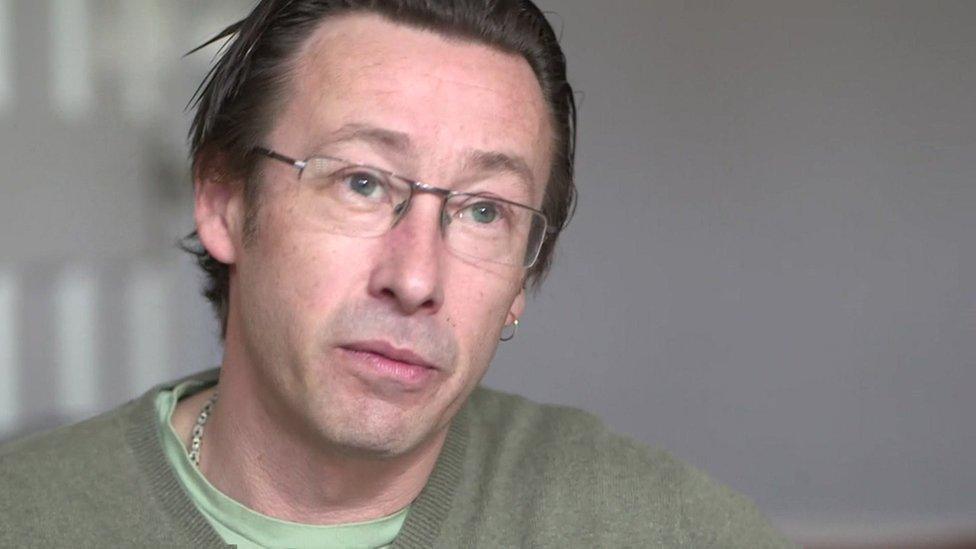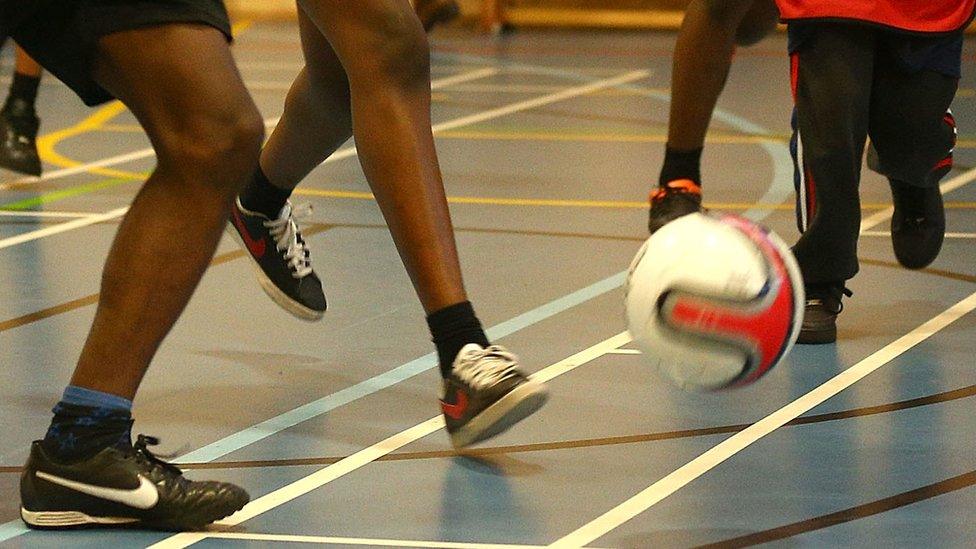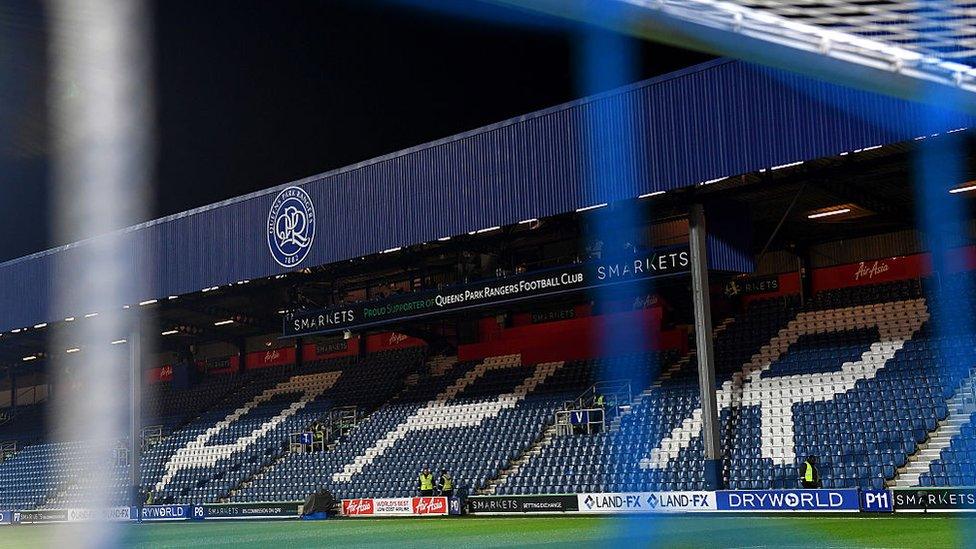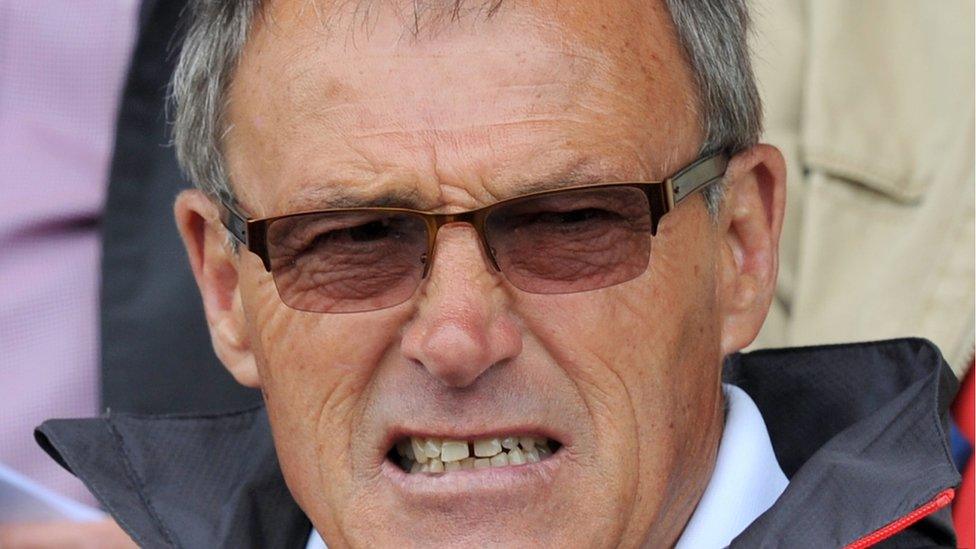Football abuse: FA reacted 'dismissively' to protection calls
- Published

The Football Association reacted "dismissively" to worries about sexual abuse in the game when they emerged in the 1990s, the BBC has been told.
Ian Ackley, who was abused by a man with links to Manchester City, said his father's calls for better protection "fell on deaf ears".
Separately, a charity has claimed the FA was too slow to implement criminal record checks in the 1990s, which may have placed children at risk.
The FA said it was unable to comment.
However, letters seen by the BBC suggest the organisation, which runs football in England, was waiting for a change in the law before it updated its child protection policies.
The organisation has now commissioned an independent investigation into the way it dealt with abuse allegations.
Dozens of letters
Mr Ackley told the BBC's Victoria Derbyshire programme that his father, who is now dead, felt the response to complaints he made to the FA was "very dismissive".
His father sent dozens of letters to MPs, government departments and sporting bodies, including the FA and Professional Footballers' Association (PFA).
In them, he had called for better protection for young players, including enhanced criminal record checks for coaches working in the game.
The letters followed a 1997 Channel 4 investigation, in which the first substantive allegations of abuse in football - focusing on coaches at Manchester City, Crewe Alexandra and Southampton - were aired.
Mr Ackley was one of a small number of young players involved in the programme to waive his right to anonymity and agree to speak openly about his abuse.
The letters, sent by his father and seen by the BBC's Victoria Derbyshire programme, raised concerns about the case and the measures then in place to protect children in the game.
'Somebody else's problem'
"This was pre-internet, pre-social media," Mr Ackley said. "Everything was handwritten and my father diligently wrote to anyone and everyone who he thought would be in a position of influence in order to affect this change. That was his real goal."
But he said his father felt that the FA and other organisations were "brushing off" attempts to improve safety in the game at the time.
"The replies were dismissive at best", said Mr Ackley. "They were always alluding to the fact it was somebody's else's problem... It was very much giving you snippets of information to appease you.

Ian Ackley said his father's letters "fell on deaf ears"
"Not only was I affected when I was abused, but when I, my Dad and the Channel 4 programme tried to bang this drum extremely loudly we were ignored for the second time."
In 2000, the FA did launch a new child protection strategy including better training and compulsory welfare officers at all clubs.
But many of the measures did not come into force for a number of years with compulsory criminal record checks not standard until at least 2003, and in some cases as late as 2007.
'Too little, too late'
Meanwhile, a former Chelsea footballer, who was paid to keep quiet about allegations of sexual abuse, has said the £50,000 he received was "nowhere near enough for the pain and suffering".
Chelsea Football Club have apologised "profusely" for the confidentiality clause, but Mr Johnson told Victoria Derbyshire this was "too little, too late".
Mr Johnson joined the club as an 11-year-old in 1970 and said he had been groomed from the age of 13 by scout Eddie Heath, who died before the allegations against him were made.
Asked if he felt other clubs may have paid players to keep quiet about sexual abuse, he said: "There may be some truth to that".
In a statement on Saturday, Chelsea said Mr Johnson had "suffered unacceptably". The club said a review into the case would take place.
'Lack of interest and hostility'
Other critics of the FA say the organisation was not fast enough to put in place enhanced criminal record checks for youth coaches and others working with children.
Those checks include details of convictions as well as so-called "soft intelligence" from local police forces about an individual and whether they should be allowed to coach under-18s.
Before 2002 it was only schools, local authorities and other statutory organisations which could ordinarily access that kind of information.
But in 1994 a Home Office pilot project was set up which allowed a handful of other groups to make use of those checks, including charities like Barnardo's and Fair Play for Children.

The FA says it now processes 55,000 criminal record checks every season
Jan Cosgrove, the chairman of Fair Play for Children, told Victoria Derbyshire that in 1997 he was approached by a youth league in Bristol to run checks on 50 managers and others involved in the local game.
The police force involved, Avon and Somerset, reported concerns about one coach who was asked to leave the club in question and was later convicted of child sex offences.
Mr Cosgrove wrote to the FA in April 1997 saying that "since Channel 4's documentary we are receiving regular enquiries from youth football clubs regarding our police checking service".
He said he later organised a conference at Leicester Football Club for other youth leagues, but he claims he was met by lack of interest and hostility by the Football Association at the time.
He claims executives at the FA contacted local clubs advising them not to take part.
"There was no reason other than we were on their patch. I can't understand that, you can't do that with child protection, you have to share," he said.
"We should have had a relationship with the FA, which would've done both parties no end of good, but more importantly it's the kids who come first, and they haven't here."
From 2003 the FA did bring in compulsory criminal record checks for anyone in the game working with children, though this does not apply when under-18s are playing in mixed-age football with adults.
The organisation says it now processes 55,000 checks every season.
The FA's independent inquiry into non-recent child sex abuse in football is being led by the barrister Clive Sheldon QC.
"The review will commence immediately," an FA statement said this week. "The findings of the review will be reported to the FA board.
"It is accepted that no final date can be agreed at this stage given the passage of time and the time it will take to recall files for review and to locate all those relevant people to interview who no longer work for the FA.
"The FA continues to work closely with the relevant authorities and respects the ongoing investigation by the police being co-ordinated by Operation Hydrant into childhood sexual abuse in football."
The BBC's Victoria Derbyshire programme is broadcast on weekdays between 09:00 and 11:00 on BBC Two and the BBC News channel.
- Published7 December 2016

- Published7 December 2016

- Published30 November 2016
